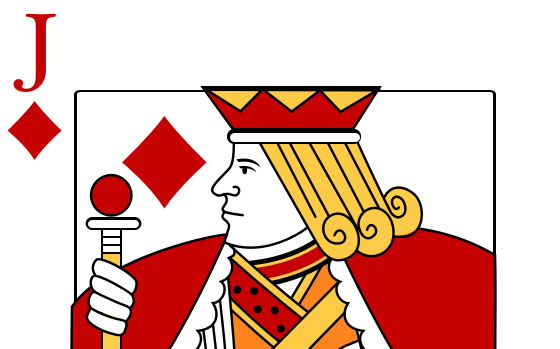It’s easier to become very good at two or three things than the best at one specific thing: this “Jack of all Trades” strategy applies both for career and entrepreneurial endeavors.
 Jack of All Trades
Jack of All Trades
In Poker a Jack is as good or better than about 3/4 (OK 76.92%) of the cards in the deck, losing only to Queen, King, and Ace. So a “Jack of all Trades” is good at many things. The full verse is
“Jack of all trades, master of none,
though ofttimes better than master of one.“
Scott Adams offered “Career Advice” in July of 2007:
But if you want something extraordinary, you have two paths:
- Become the best at one specific thing.
- Become very good (top 25%) at two or more things.
The first strategy is difficult to the point of near impossibility. Few people will ever play in the NBA or make a platinum album. I don’t recommend anyone even try.
The second strategy is fairly easy. Everyone has at least a few areas in which they could be in the top 25% with some effort.
I think this second strategy is a better one if you want to be an entrepreneur. It enables you to identify and take advantage of brokerage and translation opportunities: you can link folks who might not otherwise connect because of your ability to understand that even though they are working in different fields there is a mutually beneficial relationship possible.
There is a risk that skills and know how that you use infrequently can go stale or diminish in relative value depending upon how rapidly a particular field is advancing. The half-life or perishability of a skill is normally a function of the rate of innovation and any demographic changes in domain: how quickly does new knowledge emerge and old masters retire. Soft skills like how to run a meeting or how to manage tend to decay more slowly because people don’t change as much as technology. Adams suggests this in his closing advice:
“At least one of the skills in your mixture should involve communication, either written or verbal. And it could be as simple as learning how to sell more effectively than 75% of the world. That’s one. Now add to that whatever your passion is, and you have two, because that’s the thing you’ll easily put enough energy into to reach the top 25%. If you have an aptitude for a third skill, perhaps business or public speaking, develop that too.
It sounds like generic advice, but you’d be hard pressed to find any successful person who didn’t have about three skills in the top 25%.”
Scott Adams in “Career Advice“
One more risk being a “Jack” is that the knowledge in any one field does not enable you to differentiate yourself. So you need to consider how the various cards you have are going to combine in a useful way that is also differentiating.
Jack-of-All-Trades as Knowledge Brokers
“Nexialism is the science of joining together in an orderly fashion the knowledge of one field of learning with that of other fields. It provides techniques for speeding up the process of absorbing knowledge and of using effectively what has been learned.”
A. E. Van Vogt in “The Voyage of the Space Beagle“ [opening quote Chapter 7]
There may also be a “meta” domain that you are actually mastering by exploring a variety of its facets. E.g. if two fields are going to interact more strongly over time (think biology and computing) then knowledge of both fields is helpful. It’s also useful for fostering innovation in an arena you are new to if you can transplant working methods and technologies that are established in a field you another field into your new domain.
This knowledge brokering can also be the basis for your next startup. For an interesting perspective on this see Andrew Hargadon‘s “Firms as Knowledge Brokers.”
“Knowledge brokers span multiple markets and technology domains and innovate by brokering knowledge from where it is known to where it is not. This strategy lends itself to continuous innovation by combining existing technologies in new ways that result in dramatic synergy.”
Andrew Hargadon in “Firms as Knowledge Brokers.”

Pingback: SKMurphy » Technology Changes Fast, People, Not So Much